
Marie Louise Von Franz, on the “Unknown Visitor”
It seems to me to be one of the greatest contributions of Jung and his work that it taught us to keep our door open to the “unknown visitor.”
He also tried to teach us an approach through which we can avoid the wrath of this visitor, which every frivolous, haughty, or greedy host in the folk tales brought down on himself.
For it depends only on ourselves whether this coming of the gods becomes a blessed visit or a fell disaster.”
Archetypal Dimensions of the Psyche
Marie-Louise von Franz
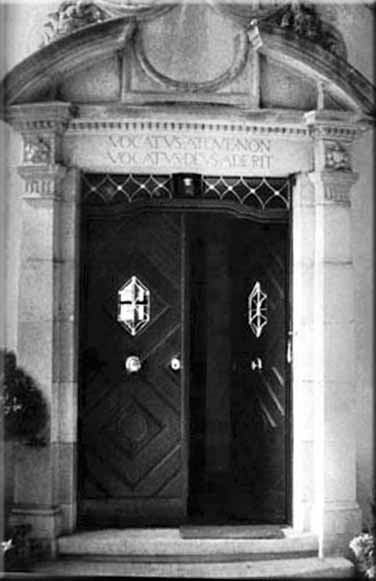
The portal at Kusnacht
[The saying is] found in Erasmus’s collection of Adagia (XVIth cent.).
It is a Delphic oracle though. It says: yes, the god will be on the spot, but in what form and to what purpose?
I have put the inscription there to remind my patients and myself: Timor dei initium sapiente [The fear of the Lord is the beginning of wisdom.]
November 19, 1960 letter from Carl Jung – C.G. Jung (1975) Letters: 1951-1961 vol. 2.
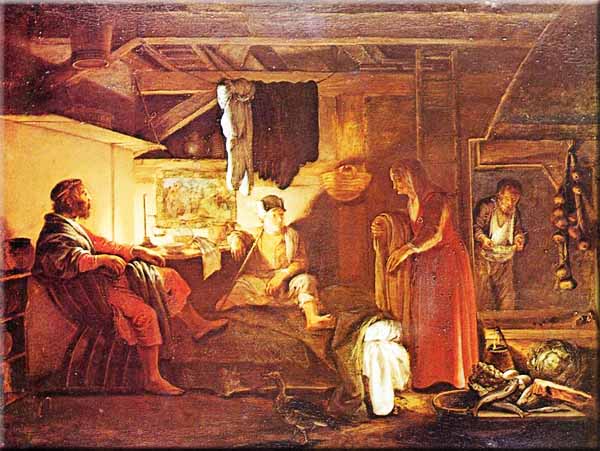
Philemon und Baucis
Adam Elsheimer (1578–1610)
1600
Oil on paste
Gemäldegalerie, Dresden
Baucis and PhilemonIn Ovid’s moralizing fable (Metamorphoses VIII), which stands on the periphery of Greek mythology and Roman mythology, Baucis and Philemon were an old married couple in the region of Tyana, which Ovid places in Phrygia, and the only ones in their town to welcome disguised gods Zeus and Hermes (in Roman mythology, Jupiter and Mercury respectively), thus embodying the pious exercise of hospitality, the ritualized guest-friendship termed xenia, or theoxenia when a god was involved.
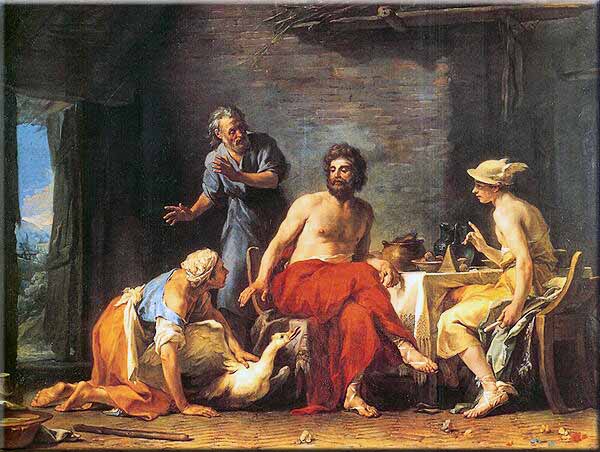
Philemon et Baucis donnant l’hospitalite
a Jupiter et Mercure
Jean-Bernard Restout (1732-1797)
French
1769
Oil on Canvas, 119 x 163cm
Zeus and Hermes came disguised as ordinary peasants and began asking the people of the town for a place to sleep during that night. They were rejected by all before they came to Baucis and Philemon’s rustic and simple cottage. Though the couple were poor, they showed more pity than their rich neighbors, where “all the doors bolted and no word of kindness given, so wicked were the people of that land.”
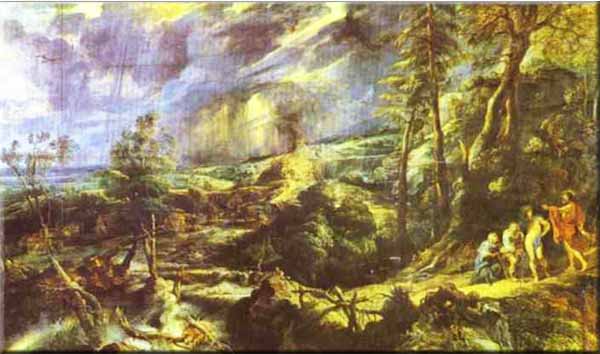
Stormy Landscape with Philemon and Baucis.
Peter Paul Rubens
c.1620.
Oil on canvas
Kunsthistorisches Museum, Vienna, Austria.After serving the two guests food and wine, which Ovid depicts with pleasure in the details, Baucis noticed that although she had refilled her guest’s beechwood cups many times, the wine pitcher was still full. Realizing that her guests were in fact gods, she and her husband “raised their hands in supplication and implored indulgence for their simple home and fare.” Philemon thought of catching and killing the goose that guarded their house and making it into a meal for the guests. But when Philemon went to catch the goose, it ran onto Zeus’s lap for safety.
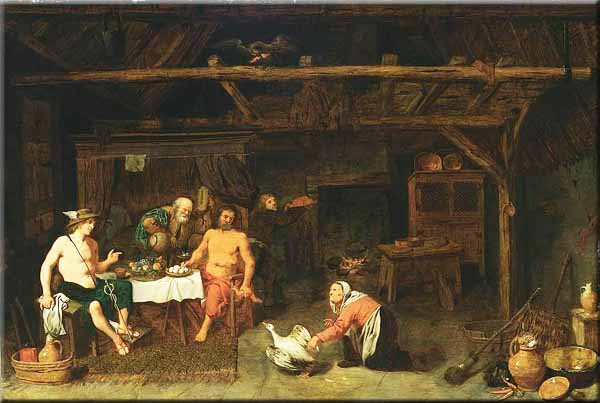
David Ryckaert the Younger (1612-1661)
Oil on panel
54 x 80 cmZeus said that they did not need to slay the goose and that they should leave the town. Zeus said that he was going to destroy the town and all the people who had turned him away and not provided due hospitality. He said Baucis and Philemon should climb the mountain with him and not turn back until they reached the top.
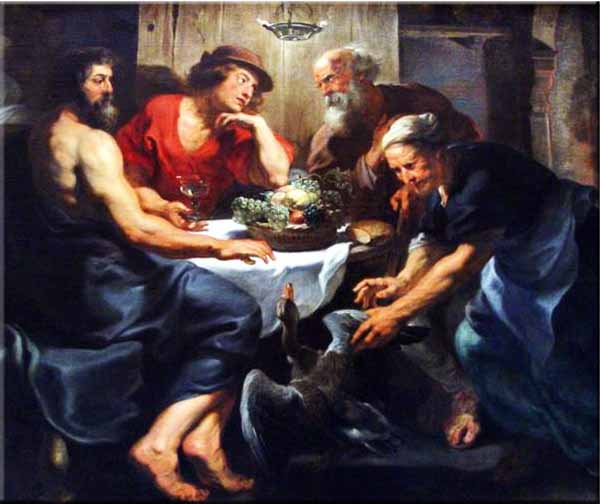
Jupiter und Merkur bei Philemon und Baucis
The workshop of Peter Paul Rubens (1625-1630)
Kunsthistorisches Museum, Vienna, Austria.After climbing the mountain to the summit (“as far as an arrow could shoot in one pull”), Baucis and Philemon looked back on the town and saw that it had been destroyed by a flood. However, Zeus had turned Baucis and Philemon’s cottage into an ornate temple. The couple was also granted a wish; they chose to stay together forever and to be guardians of the temple. They also requested that when it came time for one of them to die, the other would die as well. Upon their death, they were changed into an intertwining pair of trees, one oak and one linden, standing in the deserted boggy terrain.
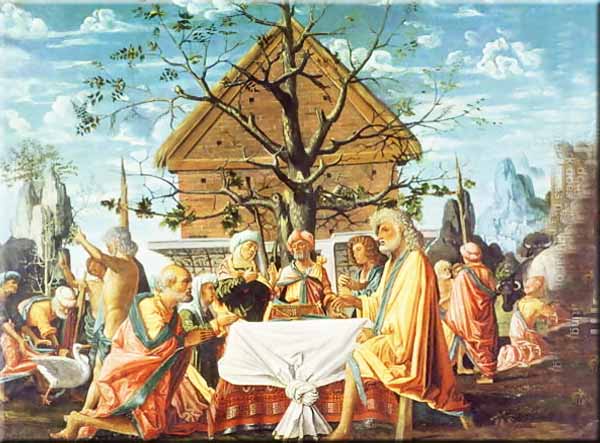
Philemon and Baucis
Bartolomeo Suardi) Bramantino (1465-1530)
c. 1500
Oil Painting Reproduction on CanvasBaucis and Philemon do not appear elsewhere in Greek myth, nor anywhere in cult, but the sacred nature of hospitality was widespread in the ancient world. After Lot and his wife had feasted them, two strangers were revealed as “two angels” (Genesis 19:1; the story is in the previous chapter). Accordingly, Hebrews 13:2 reads “Do not neglect to show hospitality to strangers, for by doing that some have entertained angels without knowing it.” The possibility that unidentified strangers in need of hospitality were gods in disguise was ingrained in first century culture. Acts 14:11-12 relates the ecstatic reception received less than two generations after Ovid’s publication of the tale by Paul of Tarsus and Barnabas: “The crowds shouted ‘The gods have come down to us in human form!’ Barnabas they called Zeus, and Paul they called Hermes”.









Whether God is recognized or not, God is present.
What a beautiful story which gave rise to a beautiful custom.
Unfortunately, this custom is scarcely found in Australia.
People invite you to a BBQ and then ask you to bring your own food and drink!!